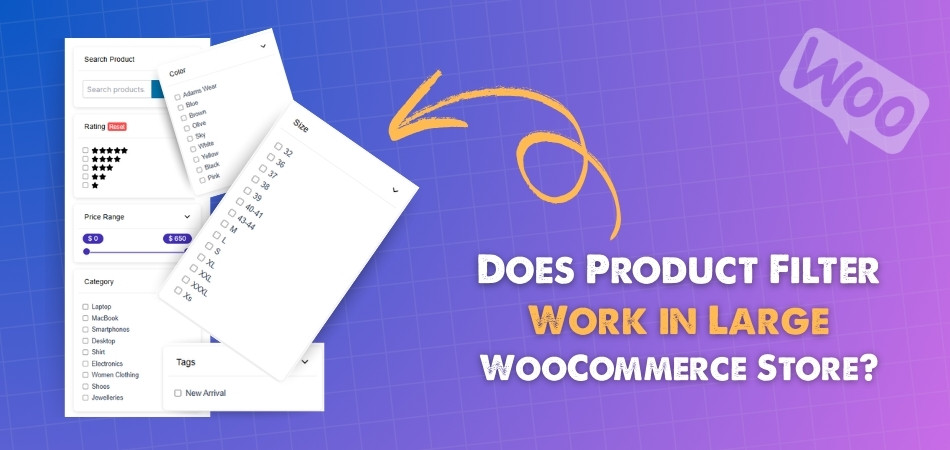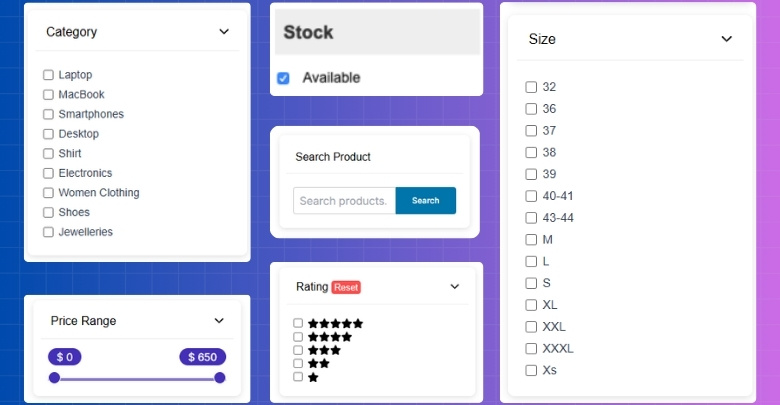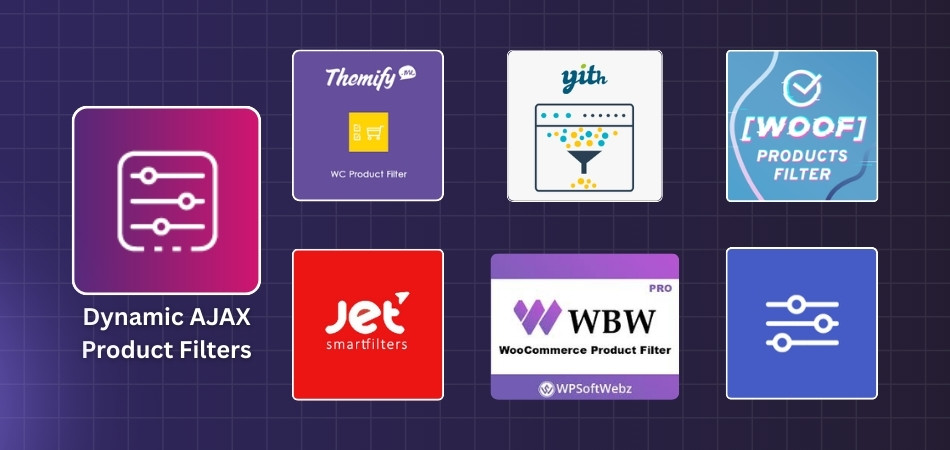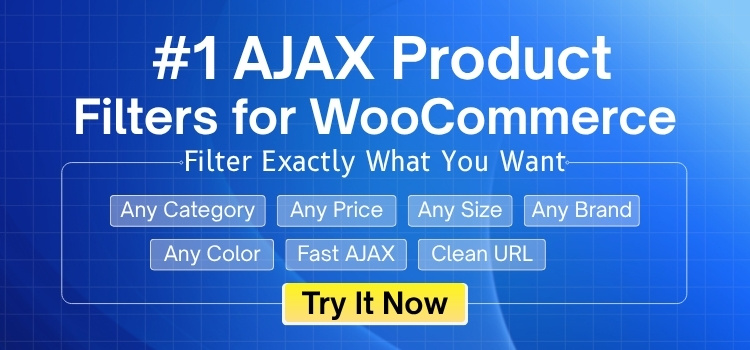WooCommerce product filters are a smart way to help shoppers find what they want without scrolling endlessly. They work great in regular stores, but things start to change when the number of products goes way up. That’s when some people start thinking about one common question: Does product filter work in large WooCommerce store?
Product filters do work in large WooCommerce stores, but they require an advanced filtering plugin with features like AJAX-based filtering and a product index to handle performance issues. These features make sure the store stays fast, loads products smoothly, and gives accurate search results even when there are thousands of items.
Do you want to know how product filters manage speed, accuracy, and user experience in big stores? Or are you curious which plugins can handle heavy loads and still perform well? Then keep reading because the following sections of this article explain everything you need to know in detail.
Does Product Filter Work in Large WooCommerce Store?
Yes, product filters do work in large WooCommerce stores, but they require an advanced filtering plugin with features like AJAX-based filtering and a product index to handle performance issues. The real question is how well they perform when the store gets very big. To know how product filters actually work in large WooCommerce stores, keep reading below.

Store Speed
When a WooCommerce store has thousands of products, speed becomes important. A well-built product filter can load results fast without slowing down the website. If filters are poorly optimized, they can make the store heavy. This is why choosing the right plugin is key.
Search Accuracy
Filters make it easier for buyers to narrow down choices. They can search by size, color, brand, or price. In large stores, this is very helpful since it reduces the time spent browsing. Accurate filters mean fewer abandoned carts and more sales.
User Experience
Customers enjoy shopping when they can find things fast. If a filter is simple and easy to use, it makes the store more user-friendly. In big stores, a clear filter system saves visitors from feeling lost. This creates a smooth shopping experience.
Plugin Quality
Not all product filter plugins are the same. Some are designed for small stores, while others can handle large ones. The quality of the plugin decides how well it works with many products. This is why many large stores prefer using solutions like Dynamic AJAX Product Filters for WooCommerce, as they can handle both speed and accuracy with ease.
Custom Options
Large stores often sell many product types. Filters can be customized to match the store’s needs. For example, a clothing store may add size and color filters, while an electronics store may add brand and feature filters. This makes shopping more effective.
SEO Benefits
Filters can also help with search engine optimization. When filters create clean and structured links, it helps search engines understand the site better. In large stores, this can improve product visibility. Good SEO means more chances for customers to find products.
What Types of Product Filters Work Best for Large WooCommerce Stores?
Product filters play a big role in making large WooCommerce stores simple to browse. They help buyers save time and quickly find what they are looking for. If you want to know which filters work best, check the details below.

Category Filters
Category filters let customers choose products based on the main sections of the store. They are useful in big stores where many types of products are sold. A customer can quickly move to the right section without wasting time. This makes browsing easy and organized.
Attribute Filters
Attribute filters let people search by product features like color, size, or brand. These filters are very effective in stores with a wide range of variations. For example, clothing stores often use them to help buyers find the right fit. They reduce confusion and help customers make faster choices.
Price Filters
Price filters allow customers to set a budget range before shopping. This type of filter is useful in big stores with items at different price levels. It saves time by showing only affordable products. This helps increase the chances of customers completing their purchase.
Rating Filters
Rating filters show products based on customer reviews and ratings. In large stores, this helps highlight the most trusted items. Many buyers prefer to check ratings before deciding on a product. Filters like these are often used as conversion-boosting filters in WooCommerce, since they guide users toward high-rated and better-selling products. This makes shopping more reliable and builds customer trust.
Stock Filters
Stock filters display only the products that are available for purchase. They save customers from the frustration of clicking on items that are out of stock. This filter is very important in large stores with fast-selling products. It improves customer satisfaction and makes the store look well-managed.
Search Filters
Search filters combine search boxes with extra filter options. They allow customers to type keywords and narrow results further with filters. This is powerful in large stores where product lists can be overwhelming. It makes finding specific products fast and easy.
How to Test Product Filter Performance in a Large WooCommerce Store?
Testing how well product filters work is important, especially when your WooCommerce store has lots of products. It helps you know if things are running smoothly or slowing down. To learn the steps to check filter performance, read more below.
Page Load Speed
Start by checking how fast the pages load when filters are used. If it takes too long, customers may leave the store. Use free tools like GTmetrix or PageSpeed Insights to test loading time. A good filter should not slow down the page much. Regular testing also helps you spot if new updates or plugins are affecting your store’s speed.
Filter Response Time
Test how fast the product list updates after clicking a filter. Slow filters can annoy users and hurt sales. Try different filter combinations and see how quickly results appear. The faster it loads, the better the shopping experience. A quick response time also makes the store feel modern and reliable.
Mobile Performance
Filters must work well on mobile devices as well. Many people shop using phones or tablets. Test the filters on different screen sizes to check if they are easy to use. Make sure nothing is broken or hard to tap. A filter that works smoothly on mobile builds confidence and keeps customers engaged.
Search Result Accuracy
Try using the filters to find specific products and see if the results are correct. For example, if you choose a red shirt, it should only show red shirts. Wrong results can confuse buyers. Accurate filters help customers trust the store. The more accurate the results, the more likely customers are to make a purchase.
Plugin Load Testing
If you are using a filter plugin, test how it performs when traffic is high. Some plugins work fine with a few products but slow down with thousands. Use a staging site or performance testing tool to check how the plugin handles heavy loads. This step ensures your filters remain reliable even during big sales or traffic spikes.
Customer Feedback
Ask your customers if they find the filters easy to use. You can also track how many people use the filters during shopping. This gives you a real view of how useful the filters are. Simple feedback can help improve the store. Regular feedback also helps in planning future updates for smoother shopping.
Common Issues with Product Filtering in Large WooCommerce Stores
Product filtering is useful in large WooCommerce stores, but it can also create problems that affect both speed and user experience. These issues may not look big at first, but they can have a lasting impact. Keep reading to see what common problems often appear.
Slow Loading
A frequent issue is that filters can slow down the site when there are thousands of products. The delay often happens if the plugin is not optimized for large stores. Customers may get frustrated when results take too long to appear. This kind of slowness can reduce sales and lower satisfaction. Choosing a strong plugin helps control this issue before it turns serious.
Heavy Database
Another challenge comes from how the filters pull data from the database. If the store holds many products, the filter queries can become heavy. This puts more pressure on the server and makes the store unstable. As the product count increases, this problem grows worse. To avoid this, store owners need a plugin that can index and process data in a smarter way.
Poor Accuracy
Sometimes filters show results that do not fully match the selected options. For example, a user may select red shoes but also see blue ones. This creates confusion and damages trust in the store. Accurate filters are very important for a smooth experience. Testing filter settings regularly ensures customers see exactly what they expect to see.
SEO Concerns
Large stores often face SEO problems caused by filters. One hidden challenge is how search engines handle dynamic URLs, since indexing filters in Google can sometimes create duplicate pages that harm SEO if not managed with canonical tags. If not controlled, this issue can weaken rankings. Store owners should keep an eye on how filters affect page URLs. Using proper SEO settings helps reduce the risks.
Mobile Usability
Not all filters are designed for smaller screens. Some may look fine on desktops but become messy on mobile devices. If customers find filters hard to use on their phones, they may leave without buying. With more users shopping on mobile, this becomes a serious concern. Testing filters on multiple screen sizes makes sure the design remains clear and simple.
Plugin Conflicts
Many WooCommerce stores use a mix of plugins to add different features. Sometimes product filter plugins can clash with others. This creates errors like broken layouts or filters not working at all. Conflicts are harder to detect in large stores with many extensions. Regular updates and choosing trusted plugins reduce the chances of this problem happening.
Best Plugins for Product Filtering in Large WooCommerce Stores
Plugins make product filtering simple in large WooCommerce stores by keeping the site fast and organized. With the right plugin, customers can easily find products without any delays. To know which plugins work best, explore the details below.

Dynamic AJAX Product Filters for WooCommerce
This plugin is built for large stores and focuses on fast filtering with AJAX technology. It updates products instantly without page reloads, making shopping smooth and simple. It is highly reliable and can handle stores with thousands of items.
Core Features:
- AJAX Filtering, Pagination, and Sorting
- Filter by Price, Rating, Category, Tags & Attributes
- Multiple Filtering Methods
- Shortcode Compatibility
- Built-in Dynamic AJAX Filter Widget & Block
- Filter Visibility Control
- Different Filters for Different Pages
- Ready for Use on Mobile Devices
- Customizable Loader
WOOF Products Filter
WOOF is a flexible plugin that helps create filters for almost any store type. It works well with both small and large catalogs. The plugin allows deep customization, making it useful for store owners who want more control.
Core Features:
- Filtering by attributes, tags, and categories
- Easy integration with shortcodes and widgets
- AJAX support for faster loading
- Advanced customization options
YITH Product Filter
YITH stands out for its clean design and smooth performance. It helps customers filter by multiple factors at once without slowing the site. The plugin is lightweight and works well on both desktop and mobile devices.
Core Features:
- Filter by brand, price, rating, and attributes
- Lightweight design that does not slow the store
- Easy to use on mobile devices
- Supports layered navigation filters
JetSmartFilters
JetSmartFilters is made for advanced filtering needs, especially for Elementor-based stores. It offers a variety of filter styles and is known for its speed. The plugin is highly customizable, which makes it suitable for different types of products.
Core Features:
- Range sliders, checkboxes, and dropdown filters
- Works smoothly with Elementor
- Fast loading with AJAX
- Flexible styling and design options
Filter Everything
Filter Everything plugin is designed to manage large product catalogs effectively. It allows unlimited filters and is highly SEO-friendly. This makes it suitable for stores that want better product search and improved rankings on Google.
Core Features:
- Unlimited filters for any product parameter
- SEO-friendly filtering structure
- Supports both attributes and taxonomies
- Optimized for large WooCommerce stores
Themify Product Filter
Themify provides a simple but powerful filtering system for WooCommerce stores. It supports multiple filter selections and live search options. The plugin is easy to customize and works well with large inventories.
Core Features:
- Multiple selection filters for better accuracy
- Live search function with instant results
- Range sliders and category filtering
- AJAX support for smooth performance
Tips for Optimizing Product Filters to Improve Load Times
Large WooCommerce stores benefit greatly from product filters, but if not properly maintained, they can cause the website to lag. Simple changes can make filters faster without harming performance. Below are useful tips to optimize filters and keep load times quick.
- Use AJAX Filtering: AJAX filtering loads results instantly without page reloads, making the process faster. It keeps customers engaged with a smoother shopping experience.
- Enable Caching: Caching reduces server load by storing results for frequent queries. This helps product filters run faster, even with heavy traffic.
- Limit Filter Options: Too many filters slow down performance and confuse shoppers. Keep only the most useful options for a simpler, faster experience.
- Optimize Database: Large stores rely heavily on their databases for filter results. Regular database cleanup ensures filters run faster and more reliably.
- Lazy Load Elements: Lazy loading avoids loading unnecessary elements until required. This method helps reduce strain and speeds up filter response times.
- Mobile Optimization: Filters should work smoothly on mobile, as many customers shop through phones. A mobile-optimized design improves both speed and usability.
- SEO-Friendly Structure: A clean filter structure avoids duplicate content issues. This ensures search engines can index pages without performance problems affecting visibility.
- Test Regularly: Performance tests reveal filter weaknesses before they cause issues. Regular monitoring keeps your store running smoothly with faster load times.
Commonly Asked Questions
Product filters in large WooCommerce stores bring both benefits and challenges. You may still have some questions about how filters affect performance, user experience, and store setup. Below are some commonly asked questions with detailed answers to help you out.
How Do Product Filters Handle Product Variations?
Good product filters allow users to filter by variation options like size or color. Each variation is handled as part of the main product. This ensures shoppers can quickly find the exact version of a product they’re looking for.
Is It Possible to Show Filters as Dropdowns?
Yes, many filter plugins allow layout options like dropdowns, sliders, checkboxes, or buttons. Dropdowns are useful for keeping the filter section neat. They work well for stores with limited space or when offering many filter options.
Do Product Filters Work with Multi-Vendor Marketplaces?
Yes, filters work in multi-vendor WooCommerce setups, but they need special attention. Filters can include vendor-based sorting, letting shoppers choose products by specific sellers. You’ll need a compatible plugin to make this work without performance issues.
Which Filter Layout Works Best for Large Stores?
Grid-style filters on sidebars or collapsible panels work best. They keep the layout neat and organized while saving space. Large stores often use layered navigation, giving customers multiple filter choices without overwhelming them with too many visible options.
What Type of Stores Benefit Most from Filters?
Filters are useful in any store with a wide product range. Clothing, electronics, beauty, and home goods stores benefit most. They help sort through multiple variations, making product discovery smooth and boosting chances of quicker buying decisions.
What Happens If Filters Are Misconfigured?
When filters are set up incorrectly, they may return wrong products or no products at all. This frustrates buyers and reduces trust in your store. Regular testing ensures filters are accurate, reliable, and match customer expectations.
Can Filters Be Combined with Sorting Options?
Yes, filters often work together with sorting tools. A shopper might filter by size and then sort results by price. This combination makes product discovery more flexible, ensuring customers can view products exactly the way they want.
Conclusion
Big WooCommerce stores can feel heavy and slow if product filters aren’t set up right. But with the right tools and some smart planning, filters can actually make the store run smoother and help customers shop faster. The trick is using filters that are built for scale.
So, does product filter work in large WooCommerce store? Yes, it absolutely does—if you choose a powerful plugin with features like AJAX filtering, proper indexing, and mobile support. These filters not only speed things up but also help users find exactly what they want with just a few clicks.
If your store is growing and you want to keep it clean, fast, and easy to shop, don’t skip on good product filters. They’re more than just a nice feature—they’re key to keeping customers happy and boosting sales.
